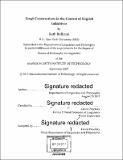Tough constructions in the context of English infinitives
Author(s)
Brillman, Ruth
DownloadFull printable version (16.92Mb)
Other Contributors
Massachusetts Institute of Technology. Department of Linguistics and Philosophy.
Advisor
David Pesetsky.
Terms of use
Metadata
Show full item recordAbstract
The dissertation was inspired by the question of why subjects cannot undergo tough movement (1). (1) a. Jonathan Franzen is easy for Anneke to criticize b. *Anneke is easy - to criticize Jonathan Franzen. To answer this question, this dissertation proposes that a spec-to-spec anti-locality constraint (in the spirit of Erlewine 2016 and Brillman & Hirsh to appear) limits subject tough movement because the subject tough movement chain is "too short." Brillman & Hirsh's spec-to-spec anti-locality constraint is given in (2). Spec-to-spec anti-locality bans subject tough movement because subject tough movement would need to involve A movement from the embedded spec-TP to the immediately adjacent spec-CP. This movement chain is banned by spec-to-spec anti-locality. (2) Spec-to-Spec Anti-Locality A-movement of a phrase from the specifier of XP must cross a specifier projected by a maximal projection other than XP. Movement from position a to 3 crosses y if and only if y dominates a but does not dominate 3 A spec-to-spec anti-locality analysis of the ban on subject tough movement also provides an explanation for why gapped degree phrases, a syntactic structure that shows many parallels to tough constructions (Lasnik & Fiengo 1974) can license subject movement (3). This dissertation will show that, compared to tough constructions, gapped degree phrases have a structurally "larger" embedded clause, with a DegP layer dominating the CP layer. This DegP layer contains a syntactically and semantically active (but optionally silent) evaluator argument in it's specifier; this argument situates the threshold of the degree predicate, allowing the degree word to be compared to a pre-determined standard. Subject movement within a gapped degree phrase would involve A-movement from spec-TP to spec-DegP, across CP and the evaluator argument in spec-DegP. This movement chain is not banned by spec-to-spec anti-locality. (3) a. Jonathan Franzen is banal [OP EVAL enough for Anneke to criticize -] b. Anneke is intelligent [OP EVAL enough - to criticize Jonathan Franzen] This dissertation will argue that spec-to-spec anti-locality can explain much more than the contrast between how tough constructions and gapped degree phrases treat subject extraction. Particularly, it will propose that anti-locality can explain a wide range of subject/non-subject asymmetries, both within English and cross-linguistically. These include complementizer trace effects, do-support asymmetries in English subject wh-questions, as well as specific subject/non-subject A alternations in Imbabura Quechua, Hebrew and Berber. Finally, this dissertation is also interested in the related question of whether or not tough construction subject/non-subject asymmetries are represented identically across both the adult and child grammars. To that end, this dissertation presents the results of a novel acquisition experiment which shows that children do not represent tough construction extraction asymmetries the same way that adults do. Specifically, these results show that-while adults find subject tough constructions ungrammatical and object tough construction grammatical-children find both subject and object tough constructions ungrammatical. Interestingly, this experiment also shows that children do not have an adult-like representation of argument extraction asymmetries in raising constructions. While the adult grammar only allows for subjects to raise, the child grammar allows both subjects and object to raise. This dissertation will discuss what these results mean, both in terms of how these results relate to previous work on the acquisition of tough and raising and in terms of what these results can tell us about the syntax of tough movement.
Description
Thesis: Ph. D. in Linguistics, Massachusetts Institute of Technology, Department of Linguistics and Philosophy, 2017. Cataloged from PDF version of thesis. Includes bibliographical references (pages 229-237).
Date issued
2017Department
Massachusetts Institute of Technology. Department of Linguistics and PhilosophyPublisher
Massachusetts Institute of Technology
Keywords
Linguistics and Philosophy.